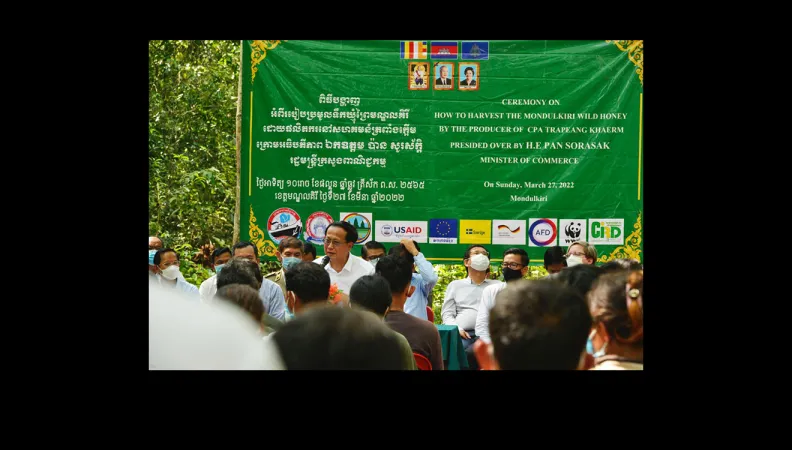Share the page
Cambodia: A New Wild Honey Label to Stimulate Rural Development
Published on

Wild honey has been cultivated in Cambodia for centuries, but it’s only recently that a new label aiming to maximize its commercial success and facilitate rural development has been launched. AFD has been supporting the development of Geographical Indications – labels that confirm the authenticity of location-based products – in Southeast Asia since 2007, the latest being that of "Mondulkiri Wild Honey" in Cambodia.
High quality products well marketed can turn the remote towns and villages where they’re made into overnight celebrities. Champagne for example is both a bubbly wine and a French region, Kalamata a Greek city as well as a tart, dark, oval olive. Both are famous geographical indications (GIs), which identify products with specific geographical origins.
They’re also a tool for rural development, as they can benefit from traditional know-how and channel it via commercial outlets, thereby increasing producers’ incomes and reducing poverty.
Mondulkiri Wild Honey: Cambodia’s Liquid Gold
Wild honey from Mondulkiri has been used since ancient times in Cambodia for its medicinal and food properties. It is collected by “honey hunters,” mainly from remote areas and by ethnic minorities who depend on its marketing for their livelihood. Mondulkiri honey is characterized by its sweetness and fragrance, characteristics that allowed for its registration as a GI in January 2021.
For products to be registered with a geographical indication, officials must ensure certain rules and standards are met. Those standards were defined in a previous project financed by USAID and implemented by WWF and CIR, which oversaw the development of the Book of Specifications for GIs. To ensure the system’s continuing viability, relevant sectors must be structured and regulated, which requires a consolidation of their promotional capacities.
Now, a project supported by AFD is taking over the process in Cambodia. Members of the Mondulkiri wild bee conservation association, which manages the GI, are receiving training and support to develop a reliable guarantee system, including internal control and traceability tools.
Protecting the forests of Mondulkiri
While this project will improve incomes for honey collectors, it will also help preserve forests. Communities themselves manage the collection of wild honey, with members owning part of the forest and creating the rules and regulations to protect it. “Each honey collector has a role to play in protecting the forest, bee and biodiversity, and must strictly follow the sustainable honey collection techniques introduced by the association,” says Vannak Mao, the project’s National Coordinator.
The fact that the entire honey value chain depends on resource protection, provides an incentive for communities to engage in sustainable practices, and to ensure a balanced use of natural resources.
